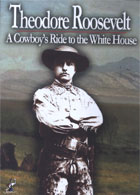
Theodore Roosevelt: A Cowboy’s Ride to the White House 2010
Distributed by Janson Media, 88 Semmons Road, Harrington Park, NJ 07640; 201-784-8488
Produced by Dorgan Films
Director n/a
DVD, color, 74 min.
College - General Adult
American Studies, Economics, History, Political Science
Date Entered: 07/08/2011
Reviewed by Michael J. Coffta, Business Librarian, Bloomsburg University of PennsylvaniaAs the title implies, this work charts the evolution of the character of Roosevelt from childhood to presidency, focusing mainly on his life-changing experiences in the Dakotas. This film defines him as a “man of contradictions.” He was Harvard educated, but chose to leave the East to become a gritty countryman. He had wealth but became a political reformer and trust buster.
With an impressive assembly of noteworthy Roosevelt scholars and even Roosevelt’s great grandson, this film brings primary sources to life with personal accounts of pivotal events in his life, including his first day in Missouri, and first hunting trip. This work offers numerous reenactments of events in Roosevelt’s life, set in sepia colored film with grainy texture and vertical lines in an effective attempt to bring the audience back to the time period. During such reenactments, the narrator skillfully impersonates Roosevelt’s voice, using quotes from Roosevelt’s memoirs and letters. Actors of Roosevelt’s contemporaries are narrated with other impressions.
This is by no means a deficit of this outstanding documentary, but it is important to note that the film gives very little treatment of Roosevelt’s recruitment of Rough Riders and his charge at Battle of San Juan Hill. While the particulars of these events are not thoroughly discussed, the impact on his persona is well stated. The Spanish American War gave him a mythic quality, and made him the “perfectly electable candidate” for the governorship of New York in 1898. While the film does not explore his presidency in detail, approximately one fifth of the film does indeed discuss his political, economic, and social achievements as the governor of New York.
This is the strongest quality of this film: while it gives due attention to major events such as the Spanish American War, it gives extensive treatment of lesser known, personal events. For example, a tremendous amount of screen time is devoted to Roosevelt’s feud with “the Marquis,” and his pursuit and apprehension of three men who stole his boat. It is through genuinely engaging and zestful stories like these that the audience truly gains a grasp of Roosevelt’s identity.
The production quality of this film is top flight. The content was exhaustively researched and brilliantly assembled. The narration is very energetic, like no other documentary. This work offers a unified series of engrossing stories of the man who celebrated the Fourth of July every day.